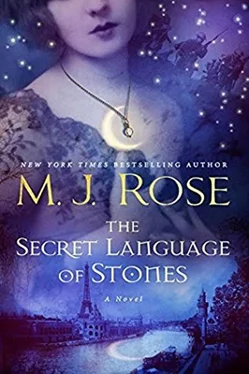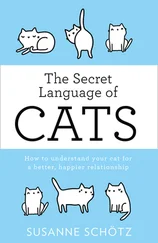Hoping to make the shelter less depressing and more comfortable since no one could ever be sure how long an air raid would last, Anna had decorated the room with two old couches covered in forest green velvet and a dozen pillows in shades of purple and blue. She’d added worn-out, ruined Persian rugs. Their reds and blues didn’t match the couches but did hide the rough dirt patches. A low table in front of the couch offered magazines, books, and hard candy in a cracked crystal bowl. Chairs were stacked against the walls in case we brought clients with us and needed more seats. There was even a small kerosene burner for boiling water to make tea and a tray of chipped Limoges china cups. These flawed items, no longer fit for a home, gave the shelter the illusion of grandeur.
I hated being down there alone, too deep in the earth. I worried about the building on top of us. If a bomb hit, would the Palais collapse and trap us here-or, worse, cave in?
To keep myself busy, I started to make tea but abandoned the effort halfway through. I didn’t really want the strong Russian tea the Orloffs favored. I didn’t want to be down in that room. I wanted the war to be over. I wanted to stop making mourning jewelry and create jewels celebrating birthdays and anniversaries, accessories that would give delight and joy, that would dazzle rather than depress.
I hated the eerie silence in the bunker. Not a calm quiet, but a nerve-racking one. Had the raid ended? Sometimes they were over in less than an hour, but often, if the bombs hit, not for several hours. I’d stashed a stack of books under the tea things and riffled through it. The last time I’d been in the shelter, I’d started reading Gaston Leroux’s popular gothic The Phantom of the Opera . I picked it up again and found I didn’t remember anything from when I’d read it the last time.
I’d only managed a few pages when I sensed someone outside. I waited in vain for the door to open and, when it didn’t, wondered why anyone would linger in the hallway. Should I check to see who it was? Only Monsieur Orloff’s paranoia about German spies using the underground, a fear fueled by the press, stopped me.
As I sat waiting, listening, trying to ascertain if anyone was there or not, I grew more nervous. No one came in, but I still thought someone was there. And then, I became aware of warmth against my thigh, directly beneath the pocket of my jeweler’s apron, which in my haste I’d forgotten to remove. When my skin started to burn, I reached into the pocket and found Madame Alouette’s crystal orb. Had I slipped it into my pocket when the siren started?
And why was it so hot? Yes, I’d been polishing it and that heated up the metal, but only while the process continued. The warmth could not have lasted this long.
I turned the piece over in my hand. The crystal was almost all clear, with a single star-shaped inclusion in the center of the lower right segment, like a piece of the night sky captured in glass. Like the orb that I’d chosen in Anna’s reading room.
I had hoped I’d never hear it again, but there was that howling, sad wind. And the mixture of voices and screams, water rushing, stones breaking. I tried to block it all out. To shut it down before it began. But I didn’t know how and the voice broke through.
I think I’m lost.
I wasn’t sure I heard the words as much as sensed them. I didn’t know what to do. Where to go.
Can you help me?
I recognized the dark voice. The voice I’d prayed was my imagination.
“Are you…” I hesitated. I still couldn’t bring myself to name him. If it were true… If I’d conjured him, then it meant that like my mother, I was… Except I had to know. I took a deep breath and whispered my question.
“Are you Jean Luc Forêt?”
Yes.
Even though I’d assumed he was, I was stunned.
How do you know my name?
“From your mother.”
Can you help me? I don’t know where I am.
“I’m not sure.”
Was his soul trapped between this world and the next? I’d read about the Bardo in Anna’s books. A Buddhist concept describing the place a soul waits between the end of life and being reborn. She’d thought some of my soldiers might be speaking from that astral plane, but I didn’t know what I believed.
Before, it seemed as if the dying soldiers had somehow left behind messages for their loved ones as they moved on, and all I’d done was sift through the detritus of everyone’s thoughts to find the right ones.
With Jean Luc I still had to sift through the clamor and racket of the universe, but his voice pulsed with urgency and desperation as he communicated directly with me.
Am I with you? Where you are?
“I’m not sure. I’m in a shelter underneath a shop.”
A shop?
“In Paris.”
This was bizarre. Impossible. Beyond reason. Irrational.
I’m not actually there, though. Am I?
“I don’t know.” I looked around the shelter in its shadows. I waved my hands in front of me and to the side. I felt nothing.
“I don’t see you. What can you see? Can you see me?”
I’m staring into darkness, but up ahead I can see light where your voice comes from.
“Light?”
Lovely light. It’s the light that you’re made of, I think. It’s almost the shape of a woman.
“But you can’t see anything else? Nothing around you?”
Nothing around me. Just your form made of light. Golden light streaming from your outline.
“Golden light?”
Yes. It’s beautiful. As if you were made of gold.
“I’m a jeweler.”
He sighed. As if the color of the gold made sense to him now.
How did you find me?
“I think you found me. Through the jewelry I was working on. I make mourning jewelry. Sometimes I get messages from dead soldiers to give to their families. I was making a talisman for your mother.”
There are a dozen soldiers dead because of me and…
His next words faded out, and I leaned forward into the gloomy shelter as if that might help me hear him more clearly. Jean Luc’s voice sounded anguished.
It was all my fault.
“You couldn’t have known a bomb was going to hit. You can’t blame yourself.”
All my men.
“How can I help you?”
Can’t. No one can. It’s too late.
“You must need something.”
Why do you think so?
“Because I can hear you. Why else would I be able to hear you if it wasn’t so I could help you?”
I’d never had a conversation with one of the soldiers before, and even as I was having this one, I knew the impossibility of it. My imagination finally had taken over. The war and the endless reports of more soldiers dying and the sadness that multiplied with every passing day and the ever-present threat from the bombs that kept coming… it was all too much. I’d snapped like the soldiers who came back, I thought. My fate was mirroring theirs. Surely I was a victim of the same war fatigue as so many others in Paris, in France, all over the world. Too much death, too much grief, too much fear. And now I’d manufactured my own soldier so I could help someone and feel I was pulling my weight.
No, not your imagination.
I heard his frustration. He wanted to prove to me that he was real. Or as real as a dead man might be.
Suddenly I felt a bit of warm wind in the shelter, almost as if someone had opened the door, but it remained shut. Then a lock of hair blew off my forehead. I quickly reached my hand out, as hopeful as I was terrified I might feel his fingers.
You felt that, didn’t you?
My shoulders started to shake. Inside of my chest I felt the wings of the trapped bird fluttering to be let out. My fear. I didn’t want to feel it. I closed my eyes. The wind brushed against my cheek.
Читать дальше












